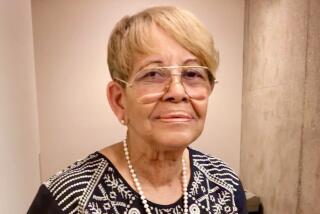Making a Difference : One School’s Approach: Involve minorities in public health careers
Only 10% of workers who have been trained in public health disciplines are African-American, American Indian or Latino even though these groups make up 22% of the country’s population. Since 1985 UCLA’s School of Public Health has sponsored a summer program for college sophomores and juniors in these three groups. Its purpose is twofold: to help ensure that they graduate, and encourage them into graduate public-health studies. The Summer Enrichment Program, open to qualifying students nationwide, informs them about career and educational opportunities in public health during eight intensive weeks of coursework and research. Participants receive program materials, on-campus room and board and, if they live more than 150 miles away, round-trip transportation costs. More than 100 students have participated in the program; all of them have graduated from college.
COMPONENTS OF EIGHT-WEEK PROGRAM
Biomedical Research Internship--152 hours
Biological Basis of Disease and Biostatistics Course--65 hours
Writing Skills Course--30 hours
Academic Testing and Study Skills Enrichment--10 hours
RESEARCH INTERNSHIP EXPERIENCES
Evaluate consequences of California Mandatory Helmet Law by examining changes in fatal and non-fatal injuries throughout the state.
Collect, analyze and summarize data on Latino health care use for use at a health services research conference.
Examine the social origin and emotional impact of adolescent stress by interviewing parents and adolescents in Los Angeles.
THE PROGRAM’S PURPOSE
“Right now minorities are very significantly underrepresented in all of the health professions. Sometimes students don’t have the background that’s necessary to be competitive to get into health professions schools. (Programs like UCLA’s) try to give students the capabilities so that they can be competitive to get in these programs and stay in. That’s the issue and that’s what the program is designed to do.”
William Holland, Deputy Director, Disadvantaged Assistance Division, Bureau of Health Professions, U.S. Department of Health and Human Services
EXAMPLES OF PUBLIC HEALTH SPECIALIZATIONS AND CAREERS
Environmental and occupational health scientists investigate the relationship between human and biological, chemical, and physical hazards in communities and workplaces. For example, scientists may study the effects of air pollutants, translate environmental concerns into policy, or evaluate waste water treatment systems.
Epidemiologists examine the distribution and determinants of disease and disability within a given population. They look at variations of disease and how the variations relate to factors such as age, race, sex, occupation, place of residence, access to health care. For example, these scientists may study the causes and prevention of cancer and the distribution of cancer research funding.
Biostatistians apply statistical procedures, techniques and methods to investigate health issues. For example, statistians may develop a computer program to measure and analyze the long term health care and treatment costs of persons suffering brain injuries.
One Participant’s Experience
Alicia Procello
I’m from Los Angeles and studied biology at UC-Berkeley. I did an internship in environmental microbiology in the summer enrichment program in 1991. After the program, I finished my last two years in college and took a job as a community health educator with Planned Parenthood. I teach college age interns to present a curriculum to junior high students about postponing sexual involvement and making responsible decisions.
I don’t think you have many minorities or people of color in college, period. You have even fewer people who are able to go on to get a master’s or doctorate degree.
All the professors in the program are minority professors so that was interesting. When you grow up being a black women there’s not much you haven’t seen, but the program opened my eyes to an academic world that maybe I didn’t know was out there. It put you in contact with a lot of people who were willing to share ideas about what you can do in the community. You walk out of the program and you say, “This is what I’m going to do with the rest of my life.” You learn about the health issues specific to cultural communities. It really sparked my motivation that you need to address culture and that you could do that in your life’s work.
They keep in touch with you, too. They said to us, “Keep in touch. We’ll review your grad school application essays, give you advice and have you talk to professors here to help you go on.”
I will definitely go to graduate school. I plan to get my master’s degree in public health and a joint degree in public policy.
More to Read
Sign up for Essential California
The most important California stories and recommendations in your inbox every morning.
You may occasionally receive promotional content from the Los Angeles Times.










